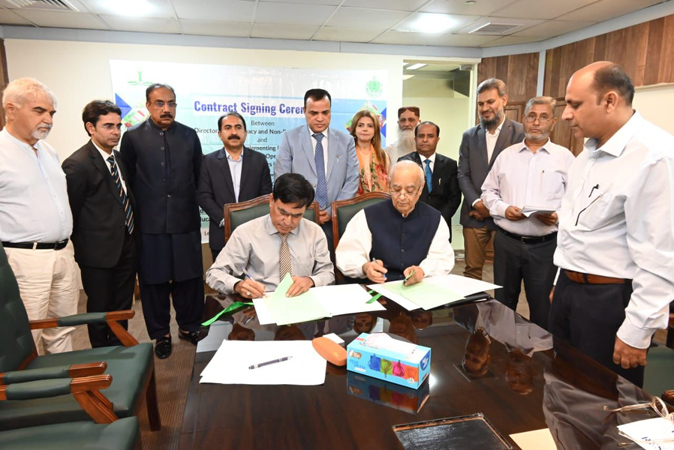 The Sindh government has signed an agreement to establish 500 non-formal education centers under a public-private partnership. Under the directives of Sindh’s Education Minister, Syed Sardar Ali Shah, the initiative aims to help 15,000 out-of-school children from underprivileged areas complete their primary education within 30 months. A ceremony was held in Karachi to formalize the agreement with partner organizations. The event was attended by Secretary of School Education & Literacy Department, Zahid Ali Abbasi, as the chief guest. Other notable attendees included Chief Executive Advisor of Curriculum Wing & Additional Secretary, Dr. Fauzia Khan, Executive Director of STEDA, Rasool Bux Shah, Director of Literacy & Non-Formal Education (LNFE) Sindh, Abdul Jabbar Mari, Director General of Monitoring & Evaluation, Mola Bux Shaikh, Deputy Chief Advisor of JICA, Abid Gul, along with other relevant officials and representatives from partner organizations.
The Sindh government has signed an agreement to establish 500 non-formal education centers under a public-private partnership. Under the directives of Sindh’s Education Minister, Syed Sardar Ali Shah, the initiative aims to help 15,000 out-of-school children from underprivileged areas complete their primary education within 30 months. A ceremony was held in Karachi to formalize the agreement with partner organizations. The event was attended by Secretary of School Education & Literacy Department, Zahid Ali Abbasi, as the chief guest. Other notable attendees included Chief Executive Advisor of Curriculum Wing & Additional Secretary, Dr. Fauzia Khan, Executive Director of STEDA, Rasool Bux Shah, Director of Literacy & Non-Formal Education (LNFE) Sindh, Abdul Jabbar Mari, Director General of Monitoring & Evaluation, Mola Bux Shaikh, Deputy Chief Advisor of JICA, Abid Gul, along with other relevant officials and representatives from partner organizations.
During the event, Secretary Zahid Ali Abbasi stated that under the minister’s guidance, non-formal education centers would be established specifically in underprivileged areas. In the first phase, five districts with relatively lower literacy rates-Jacobabad, Kashmore, Mirpurkhas, Tharparkar, and Umerkot-have been selected. He emphasized that Sindh is the first province in Pakistan to develop a formal curriculum for non-formal education. He further added that along with traditional education systems, the government is also working on non-formal initiatives. This project will provide 15,000 out-of-school children with an alternative path to education outside the conventional system. The secretary urged partner organization to priorities girls’ participation in this initiative.
Speaking on the occasion, Director of Literacy & Non-Formal Education Sindh, Abdul Jabbar Mari, explained that under the Accelerated Learning Program, students will be able to complete their primary education within 30 months. Additionally, after completing the primary course, students will receive assistance in securing admission to elementary school (class 6), ensuring continuity in their education. He further highlighted that the entire initiative is based on free education, including learning materials and other necessary resources. The program is being implemented with the help of NGOs and Community-Based Organizations (CBOs) to ensure efficiency, skill development, and transparency.
At the event, the Directorate of Literacy & Non-Formal Education (DL&NFE) signed agreements with 10 partner organizations, who also pledged their full cooperation in executing the project successfully.